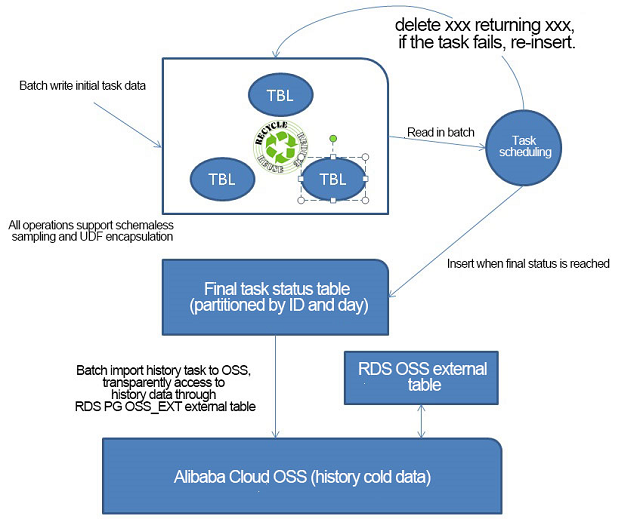Original article: https://yq.aliyun.com/articles/137060
For task state management in a task scheduling system, the database usually stores the process and state of task scheduling, and controls the lock of a task. Advisory Lock is very easy to implement for a small number of tasks. But how can we design a task state management database for processing hundreds of millions or even several billion tasks every hour?
In a task scheduling platform for multiple users (such as, cloud task scheduling platform for all tenants), a major challenge is to write the task data. Updating the task state (massive, each task is updated at least once) is another challenge.

Cloud task scheduling has the following features:
Sample PostgreSQL design has following features:
1.Initial task table for storing tasks generated by a user.
create table task_init ( -- Initial task table
uid int, -- User ID
ptid serial8, -- Parent task ID
tid serial, -- Subtask ID
state int default 1, -- Task state: 1 indicates the initial state; -1 indicates being processed; 0 indicates processing completed
retry int default -1, -- Number of retries
info text, -- Other information
ts timestamp -- Time
); 2.Task history table used for storing the final state of a task.
create table task_hist ( -- Task history table
uid int, -- User ID
ptid int8, -- Parent task ID
tid int, -- Subtask ID
state int default 1, -- Task state: 1 indicates the initial state; -1 indicates being processed; 0 indicates processing completed
retry int default -1, -- Number of retries
info text, -- Other information
ts timestamp -- Time
); 3.To simplify the test, we will make the partitions by the user ID.
(For the rotate design and multi-level partition design mentioned above, refer to the articles mentioned at the end of this document.)
do language plpgsql
$$
declare
begin
for i in 1..1000 loop
execute 'create table task_init_'||i||' ( like task_init including all)';
execute 'create table task_hist_'||i||' ( like task_hist including all)';
end loop;
end;
$$
; 4.To facilitate the test, use the schemaless design, generate a user task's initial data, and write and put it in the plpgsql logic.
create or replace function ins_task_init(
uid int,
info text,
ts timestamp
) returns void as
$$
declare
target name;
begin
target := format('%I', 'task_init_'||uid);
execute format('insert into %I (uid,info,ts) values (%L,%L,%L)', target, uid,info,ts);
end;
$$
language plpgsql strict; 5.Run a task by the following steps.
In order to test the database's performance, we need to write the logic for the three steps into plpgsql. At the same time, we have to use the delete limit feature in batch to take out several tasks at once.
We have used the CTID line number to a position here to achieve optimal performance. In this way, we do not have to use an index and can get better performance.
We have used Advisory Lock so that a single user has no parallel tasks (parallel is allowed in the actual business).
We have not tested the update state here. A part of task_init is updated (compared with insert and delete, its proportion is small and can be ignored) when the task fails.
autovacuum of the table task_init is disabled, and processing is made via rotate.
create or replace function run_task(
uid int,
batch int
) returns void as
$$
declare
target1 name;
target2 name;
begin
target1 := format('%I', 'task_init_'||uid);
target2 := format('%I', 'task_hist_'||uid);
execute format('with t1 as (select ctid from %I where pg_try_advisory_xact_lock(%L) limit %s) , t2 as (delete from %I where ctid = any (array(select ctid from t1)) returning *) insert into %I select * from t2;', target1, uid, batch, target1, target2);
end;
$$
language plpgsql strict; 1.Write the initial task
postgres=# select ins_task_init(1,'test',now()::timestamp);
ins_task_init
---------------
(1 row)
postgres=# select ins_task_init(1,'test',now()::timestamp);
ins_task_init
---------------
(1 row) 2.Run the task
postgres=# select run_task(1,100);
run_task
----------
(1 row) 3.View whether the task ends and migrate it to the history table
postgres=# select * from task_init_1;
uid | ptid | tid | state | retry | info | ts
-----+------+-----+-------+-------+------+----
(0 rows)
postgres=# select * from task_hist_1;
uid | ptid | tid | state | retry | info | ts
-----+------+-----+-------+-------+------+----------------------------
1 | 1 | 1 | 1 | -1 | test | 2017-07-20 15:26:32.739766
1 | 2 | 2 | 1 | -1 | test | 2017-07-20 15:26:33.233469
(2 rows) 1.Generate the performance of a task
vi ins.sql
\set uid random(1,1000)
select ins_task_init(:uid,'test',now()::timestamp);
pgbench -M prepared -n -r -P 1 -f ./ins.sql -c 32 -j 32 -T 120
query mode: prepared
number of clients: 64
number of threads: 64
duration: 360 s
number of transactions actually processed: 86074880
latency average = 0.268 ms
latency stddev = 0.295 ms
tps = 239079.558174 (including connections establishing)
tps = 239088.708200 (excluding connections establishing)
script statistics:
- statement latencies in milliseconds:
0.001 \set uid random(1,1000)
0.267 select ins_task_init(:uid,'test',now()::timestamp);
postgres=# select count(*) from task_init_1;
count
-------
88861
(1 row)
postgres=# select count(*) from task_init_2;
count
-------
88196
(1 row)
....
postgres=# select count(*) from task_init_1000;
count
-------
88468
(1 row) 2. Run the performance of the task
(obtain 10,000 tasks at once in a batch)
vi run.sql
\set uid random(1,1000)
select run_task(:uid,10000);
pgbench -M prepared -n -r -P 1 -f ./run.sql -c 32 -j 32 -T 120
query mode: prepared
number of clients: 32
number of threads: 32
duration: 120 s
number of transactions actually processed: 3294
latency average = 1171.228 ms
latency stddev = 361.056 ms
tps = 27.245606 (including connections establishing)
tps = 27.247560 (excluding connections establishing)
script statistics:
- statement latencies in milliseconds:
0.003 \set uid random(1,1000)
1171.225 select run_task(:uid,10000);
postgres=# select count(*) from task_init_1000;
count
-------
18468
(1 row)
postgres=# select count(*) from task_hist_1000;
count
--------
224207
(1 row) 1.Generate 239,000 tasks per second
2.Consume 272,000 tasks per second
No tasks are accumulated.
PostgreSQL plays an important role in the cloud massive task scheduling system.
A single PostgreSQL instance is sufficient to process task generation and consumption every hour.
The task scheduling system is more complex than MQ. Similar to the MQ superset, if you need MQ, you can use RDS PostgreSQL. Its performance indicator is better than that in the test above.

2,593 posts | 793 followers
Followdigoal - June 26, 2019
digoal - May 28, 2019
ApsaraDB - August 8, 2024
Alibaba Clouder - July 16, 2020
ApsaraDB - August 19, 2025
Alibaba Cloud MaxCompute - September 18, 2018

2,593 posts | 793 followers
Follow ApsaraDB RDS for PostgreSQL
ApsaraDB RDS for PostgreSQL
An on-demand database hosting service for PostgreSQL with automated monitoring, backup and disaster recovery capabilities
Learn More PolarDB for PostgreSQL
PolarDB for PostgreSQL
Alibaba Cloud PolarDB for PostgreSQL is an in-house relational database service 100% compatible with PostgreSQL and highly compatible with the Oracle syntax.
Learn More ApsaraDB RDS for MySQL
ApsaraDB RDS for MySQL
An on-demand database hosting service for MySQL with automated monitoring, backup and disaster recovery capabilities
Learn More ApsaraDB RDS for MariaDB
ApsaraDB RDS for MariaDB
ApsaraDB RDS for MariaDB supports multiple storage engines, including MySQL InnoDB to meet different user requirements.
Learn MoreMore Posts by Alibaba Clouder